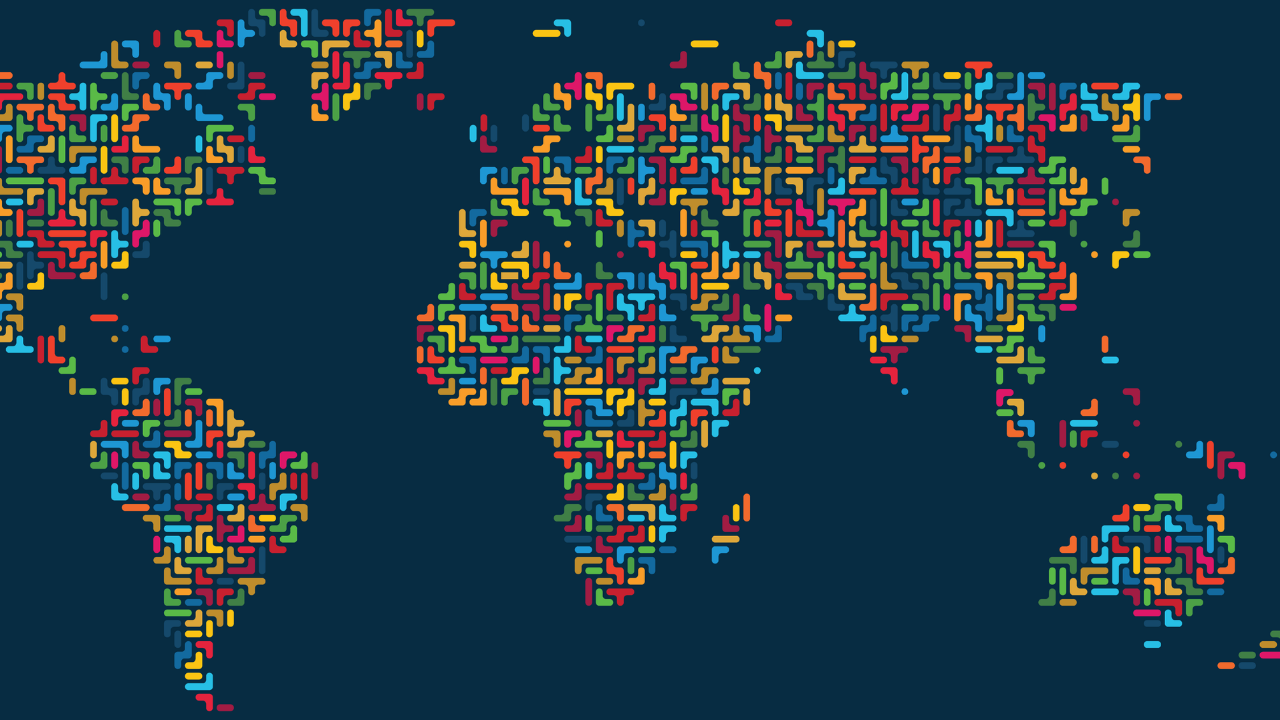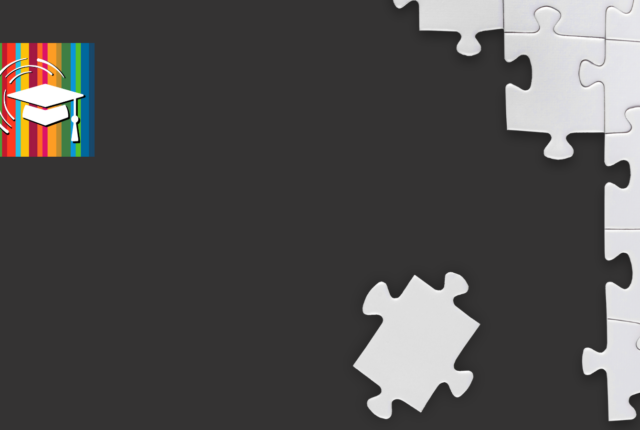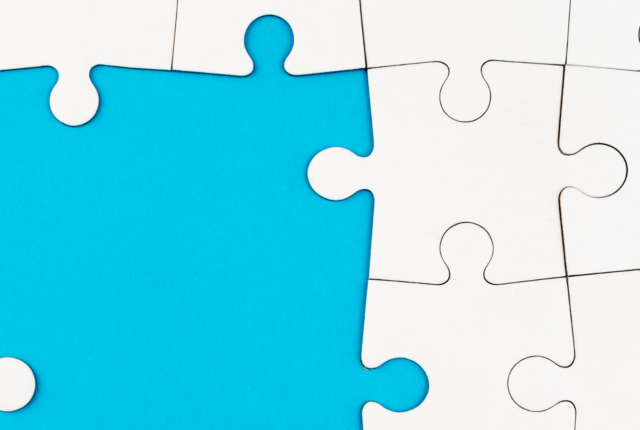What is the latest research on Sustainable Development? How can researchers support Agenda 2030 and the SDGs? From September 20-22, 2021, the SDG Academy participated in the International Conference on Sustainable Development, hosting and contributing to events focused on building a more sustainable and inclusive planet.
Language of Sustainable Development: Making Sense of the 2030 Agenda Within and Across Contexts
The SDG Academy first hosted a research conference theme at ICSD 2020. As the first fully virtual ICSD conference, last year’s event taught us a lot about how eager our community was to discuss issues of Education for Sustainable Development (ECD) in a research conference capacity. Rather than recreating an ECD event for 2021, our aim this year was to expand the call and consider other ways that the global sustainable development narrative was being translated.
On Sept. 20, 2021, the session kept the scope of the call quite wide to attract “translations” of the sustainable development narrative that were relevant across different languages and regionalizations, in keeping with the traditional understanding of translations. However, the session sought broad applications of how work, issues, solutions, and initiatives could be translated from context to context.
The response to this call was as diversified and varied as hoped. Subject matter of this session covered university best practices, innovative research methods, community-building, recognition of the common good, and more! This session was well represented by a global audience, with participants joining us from dawn, California and Brazil, til dusk, with one colleague in New Zealand staying on the call until 4am-local time.
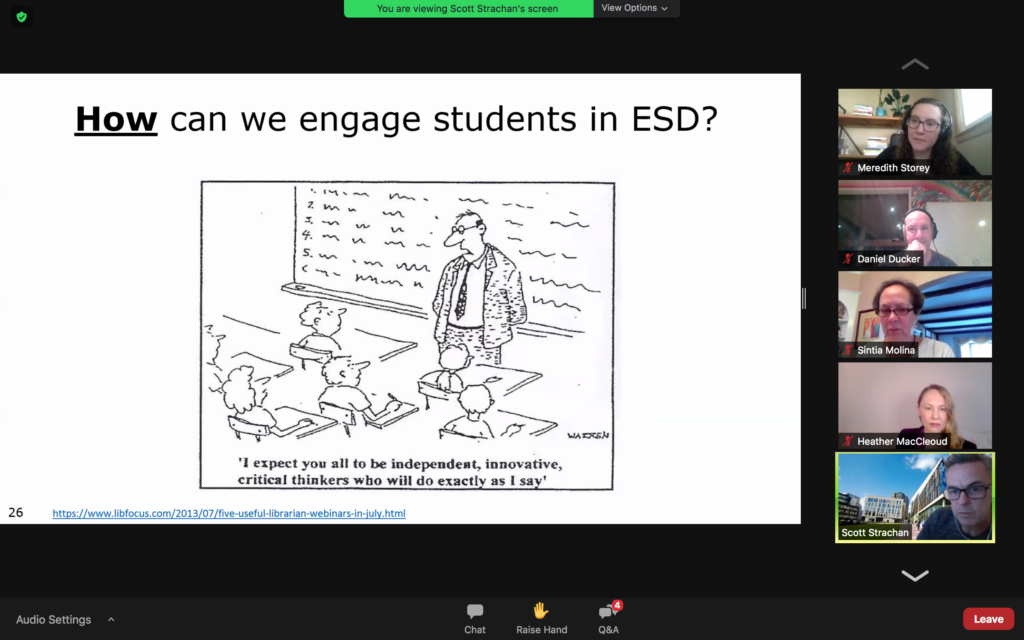
The success of this parallel session wouldn’t be possible without the tireless efforts of the researchers themselves who selflessly joined and aided an active discussion despite the timings of this global event presenting local timezone inconveniences. It was truly a snapshot of how we can all contribute to the Goals despite our differences in time, expertise, area of focus, and areas of passion.
Envision 2050
In January 2021, Earth Hacks launched a project with Arizona State Universities’ Global Futures Lab called Envision 2050: Designing Sustainable Futures, a dynamic ideathon that tasks participants with designing the next set of Sustainable Development Goals (SDGs), or redesigning them entirely. The event took place at the American Association for the Advancement of Science’s (AAAS) annual meeting where a live judging panel picked eight winners.
On Sept. 20, 2021 during ICSD, three of the winning groups were highlighted for excellence in the field. These groups represented a wide range of geographic backgrounds, educational levels, and SDG-expertise. Each of the hackathon winners discussed their project work, SDG-relevance, and operationalizing their projects. The session was moderated by Dr. Meredith Storey who facilitated the discussion on Earth Hacks Board of Directors Chair, Mr. Kyle Gracey. Storey lead a discussion on the next steps for each project––including work that will be carried into graduate school programs, tasks that will be mapped with our ESRI partners, and next steps that will be aligned with US Green Buildings Council international standards for LEED buildings and projects.
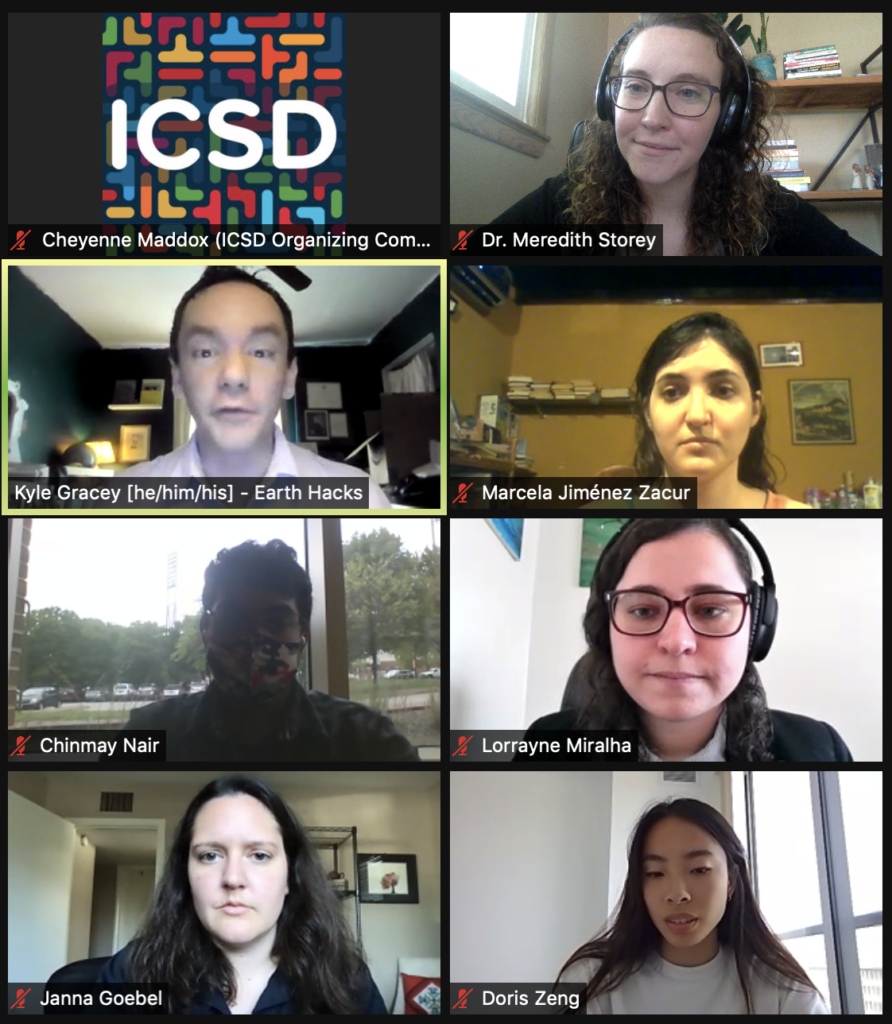
The Earth Hacks – ASU partnership aims to continue next year. We look forward to seeing their innovations and future work at ICSD 2022.
Chat with a Teacher: How do you use education to create a better world?
Organized by Mission 4.7, on Sept. 21, 2021 this session featured four outstanding classroom teachers—all Global Schools Teacher Advocates—who spoke about the obstacles, opportunities, and impact of teaching the next generation to understand and address the world’s greatest challenges. George de la Cruz, a teacher from the Philippines, spoke about the importance of case-based learning to localize the SDGs. Santha Nair, a primary school ESL teacher from Malaysia, spoke about her work using language education to introduce students to sustainable development and global citizenship topics, and also shared the Environmental Education Playbook for Educators, which she created along with 25 other Malaysian teachers. Javeria Rana, a primary and secondary school teacher from Pakistan, presented a variety of social action projects her students undertook to understand and advocate for more sustainable practices. Lilian Oloo, an early childhood educator from Kenya, explained how she teaches the three pillars of sustainable development––environmental, economic, and social––to “our youngest global citizens.” Finally, all four teachers shared their thoughts on how education must change to enable more successful education for sustainable development.
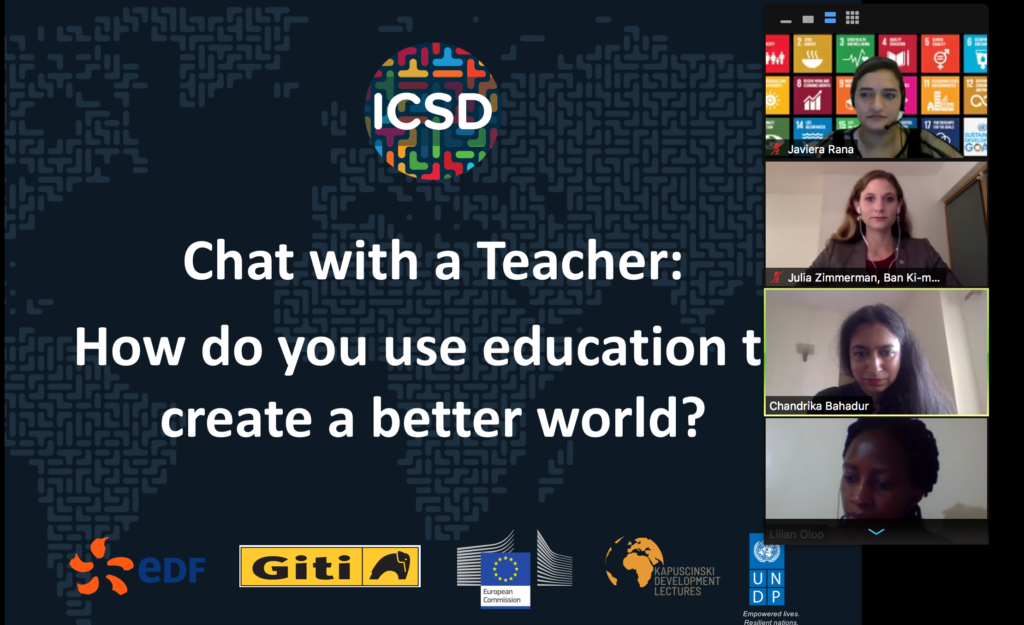
The session was moderated by Chandrika Bahadur, Director of the SDG Academy and Chair of the Mission 4.7 Secretariat; and Julia Zimmerman, Program Officer at the Ban Ki-Moon Centre for Global Citizens and Member of the Mission 4.7 Secretariat.
Watch the recording to learn more about the session!
SDG Publishers Compact: Aligning Scholarly Activity with the Sustainable Development Goals
An emerging international trend in Academic Publishing is aligning scholarly work and publishing with the Sustainable Development Goals. On Sept. 22, 2021, this ICSD side event informed, amplified & encouraged significant concrete action on the SDG Publishers Compact that will ultimately influence the priorities of faculty researchers, bringing scholarly activity in greater alignment with the SDGs.
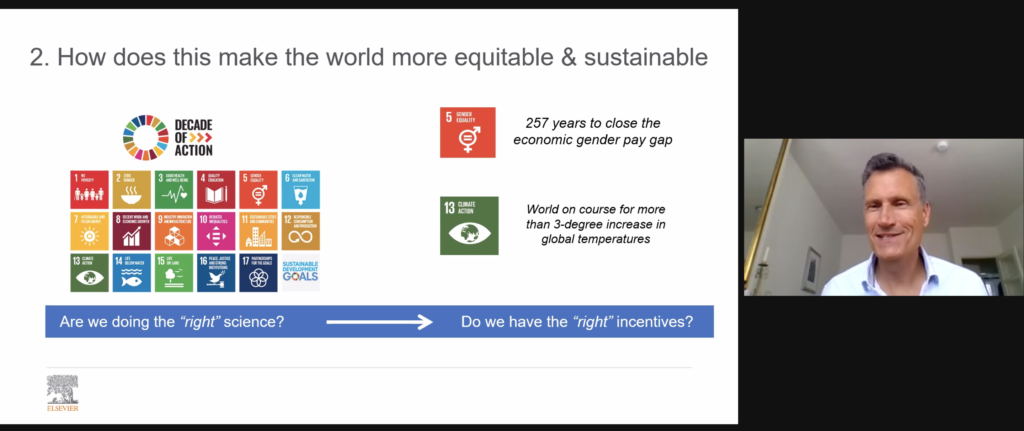
The 120 total attendees across the full hour of our session listened to leaders in the field including Debra Rowe, President of the U.S. Partnership for Education for Sustainable Development; Julia Christensen-Hughes, Senior VP Information Industry Relations and Academic Ambassador at Elsevier and former President of the International Publishers Association (IPA); David Steingard, Associate Professor of Management; Michiel Kolman, Senior VP Information Industry Relations and Academic Ambassador at Elsevier and former President of the International Publishers Association (IPA); and Sherri Aldis, Chief of United Nations Publications in the Department of Global Communications at the United Nations.
Watch the recording to learn more about the session!
Decolonizing Sustainable Development Education
The Global Association of Master’s in Development Practice (MDP) programs organized the ICSD side event Decolonizing Sustainable Development Education on Sept. 22, 2021. Dr. Vanessa Andreotti from the Department of Educational Studies at the University of British Colombia offered the framing remarks at this session. In her talk, she described decolonization as referring to a sense of not being able to move forward beyond the topic of colonization because of a feeling of being “trapped” in a dialogue that is limiting in that it does not adequately acknowledge the genocide, violence, dispossession, expropriation, or destitution that plagues any talk on the topic. Decolonization must be addressed with the right type of education, an education in which, as she put it, “we sit with the good, the bad, the broken, and the messed up of humanity within and around us.”
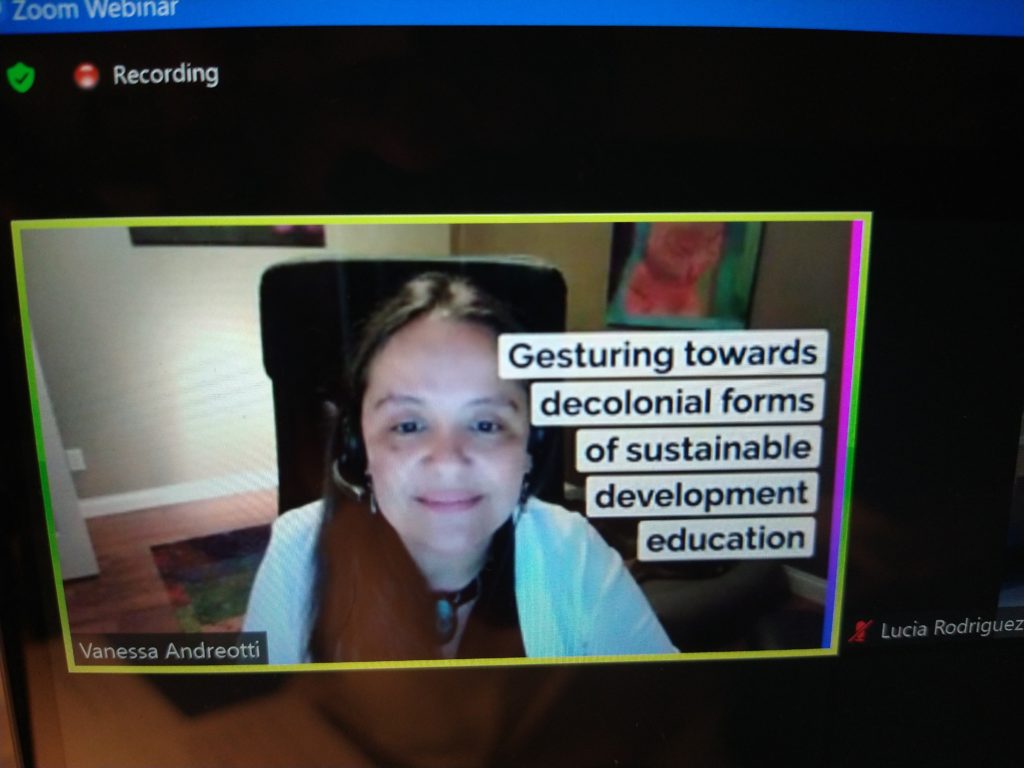
She made it clear that at the core of this type of education is engagement in the in-depth practice of hyper self-reflectivity. As she put it, such practice calls for deep and unceasing reflection on questions such as: To what extent are you reproducing what you critique? To what extent are you avoiding looking at your own complicities and denials, and at whose expense? Who is the (project) really about? Who is benefitting the most from this project? In what ways could this project be read as self-serving or self-congratulatory? What are you doing this for?
These framing questions are very important in that an increasing number of academic institutions and research centers around the world are creating interdisciplinary programs in sustainable development. Special thanks to all the speakers including MDP faculty members from the University of Ibadan, Nigeria; Regis University, USA; and the TERI School of Advanced Studies, India.
Summary
In total there were 10 plenaries, 38 parallels, and over 2,000 participants across the full ICSD agenda highlighting inspiring work dedicated to building a sustainable and inclusive planet.
Thank you to all our speakers and attendees for contributing to this important conversation about strengthening the sustainable development narrative through interdisciplinary education and research! The SDG Academy looks forward to building on the success of these events at ICSD 2022.
